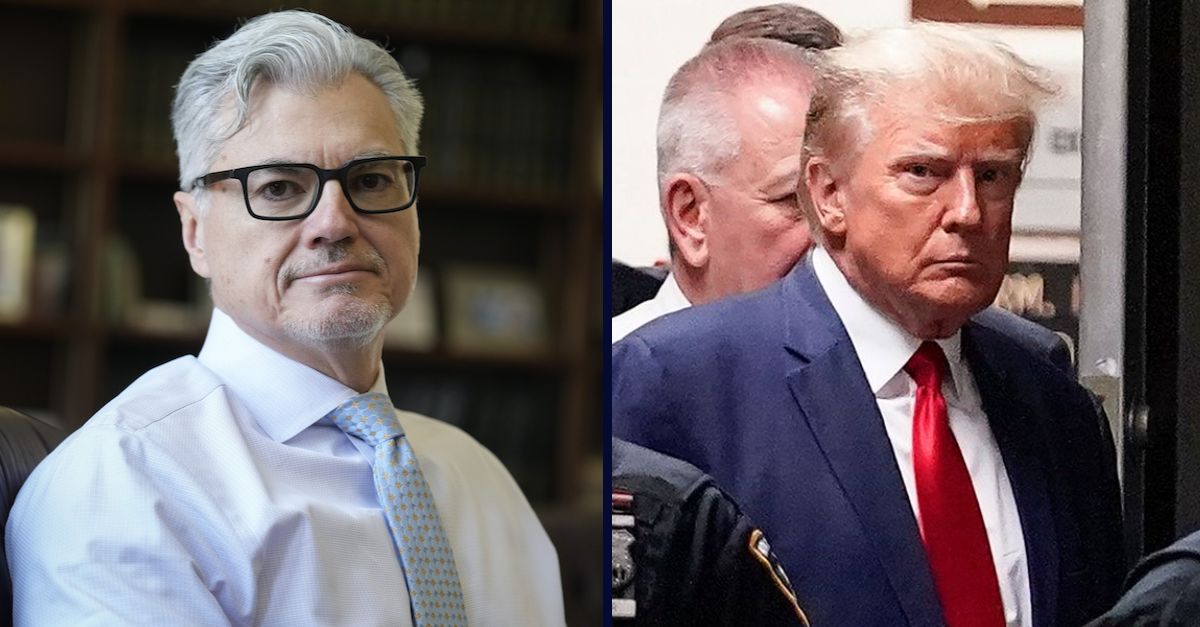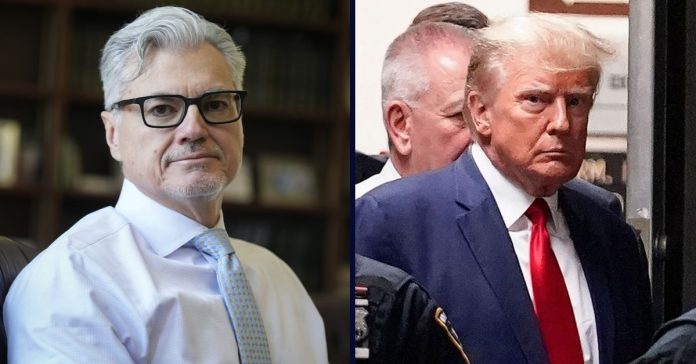
Left: Judge Juan Merchan poses for a picture in his chambers in New York, Thursday, March 14, 2024. Merchan is presiding over Donald Trump’s hush money case in New York (AP Photo/Seth Wenig). Right: FILE – Former President Donald Trump is escorted to a courtroom, April 4, 2023, in New York (AP Photo/Mary Altaffer, File).
Former President Donald Trump repeatedly pushes the envelope on what a criminal defendant can publicly say about his own case, witnesses, as well as court personnel and their families. In the federal criminal case based on the events of Jan. 6, 2021, for example, U.S. District Judge Tanya Chutkan and the D.C. Circuit Court of Appeals prohibited Trump from talking about witnesses, court personnel and potential jurors after the former president lashed out against special prosecutor Jack Smith and potential witnesses in the case.
New York County Supreme Court Justice Judge Merchan, in Trump’s pending New York state hush-money case, initially followed Chutkan’s lead, and prohibited Trump from talking about case witnesses, jurors, court staff and counsel. This week, Merchan expanded his prohibition to bar Trump from discussing case participant’s families — most notably, Merchan’s own daughter, who has long been a favored target of Trump’s ire.
Merchan further included an additional sanction if Trump violates the order: Trump will not be permitted to know the names of the jurors if “he engages in any conduct that threatens the safety and integrity of the jury or the jury selection process.”
Both judges have properly protected court officials and family members from Trump’s megaphone. However, Merchan went too far in including the additional sanction, creating a danger that this could be reversed by an appellate court and potentially delay the New York state criminal trial.
Merchan’s latest order in Manhattan District Attorney Alvin Bragg’s case against the former president is a bridge too far in disallowing Trump to know the names of the jurors if “he engages in any conduct that threatens the safety and integrity of the jury or the jury selection process.” New York state law generally provides a defendant with the right to know the names of the jurors, unless a defendant waives that right by tampering with, or planning to tamper with, the jury.
But Merchan’s order includes conduct much broader than tampering with, or planning to tamper with, the jury. In making his order, the judge has threatened to retaliate and strip Trump of his right to disclosure of juror names if he speaks about the case in a manner which could impact the jury selection process. For example, Trump could write on Truth Social tomorrow, “the Bragg case is a Witch Hunt.” Merchan could then decide that potential jurors were influenced by this sort of statement and Trump’s conduct affected the “jury selection process” under his order. As a result, the judge could deprive Trump of notice of the names of the jurors in his case, and his ability to participate in a careful and thorough voir dire of the potential jurors. The 6th Amendment of the United States Constitution provides for a trial by an impartial jury. This includes the right to a careful voir dire designed to uncover any bias as to the issues or the defendant. As such, both sides in a criminal case expect to be permitted to vet potential jurors prior to jury selection.
Further complicating this potential sanction is the question of whether the judge will provide the prosecution with the juror names, but keep this information from the defense. If yes, then Merchan is giving the prosecution a distinct advantage, and impacting Trump’s constitutional right to a fair trial and due process of law. Generally, the parties will want to review the information available to them about the potential jurors, and conduct their own research. Parties will seek to learn such things as criminal histories, political party affiliations, employment history, social media posts, and/or bankruptcy filings.
None of this is obtainable if a party doesn’t know the names of the potential jurors. Criminal defense attorneys have a right to strike jurors for any reason — known as peremptory strikes — and many of these strikes are based upon juror research conducted before the first day of trial. Additionally, jurors can be struck for cause if it is determined that they cannot be fair, and this determination is most often gleaned from the pretrial juror research conducted by the parties.
I assume Merchan, like the judges in the other Trump cases, is frustrated by Trump’s defiance of court rules and protocols. Nevertheless, Merchan needs to remain neutral and not retaliate against Trump and take away a fundamental right to a careful voir dire designed to uncover any bias to the issues or defendant. Judges have the right and obligation to ensure that jurors are protected, but a judge cannot retaliate against a criminal defendant to the extreme level of denying him a right to which he is entitled. The Supreme Court of the United States has repeatedly held that retaliation by a judge or prosecutor against a defendant who is asserting his constitutional rights violates that defendant’s right to due process of law.
Trump will no doubt make many more intemperate remarks that will try Merchan’s patience. Nevertheless, Merchan needs to avoid trying to even the score with defendant Trump by making it more difficult for him to have a say in selecting his jury.
If Trump violates Merchan’s order as it stands today, Merchan still has options to control Trump without taking away a right. Merchan can lecture Trump yet again; charge him with criminal contempt, which is punishable by a fine and/or jail time; or expand the conditions of pretrial release to include the gag order, and revoke Trump’s bond if he violates the order again. Merchan, though, appears to be retaliating against Trump and threatening to take away his right to know the names of his potential jurors and engage in a careful voir dire to uncover any bias. It is in our country’s best interest that former President Donald Trump receives the fairest trial possible, and that such trial is not subject to additional delays. Merchan’s latest order makes this less likely to happen.
John P. Fishwick Jr. is the founder and owner of Fishwick & Associates PLC, a trial law firm in Roanoke, Virginia. John previously served as the United States Attorney for the Western District of Virginia.
Have a tip we should know? [email protected]

